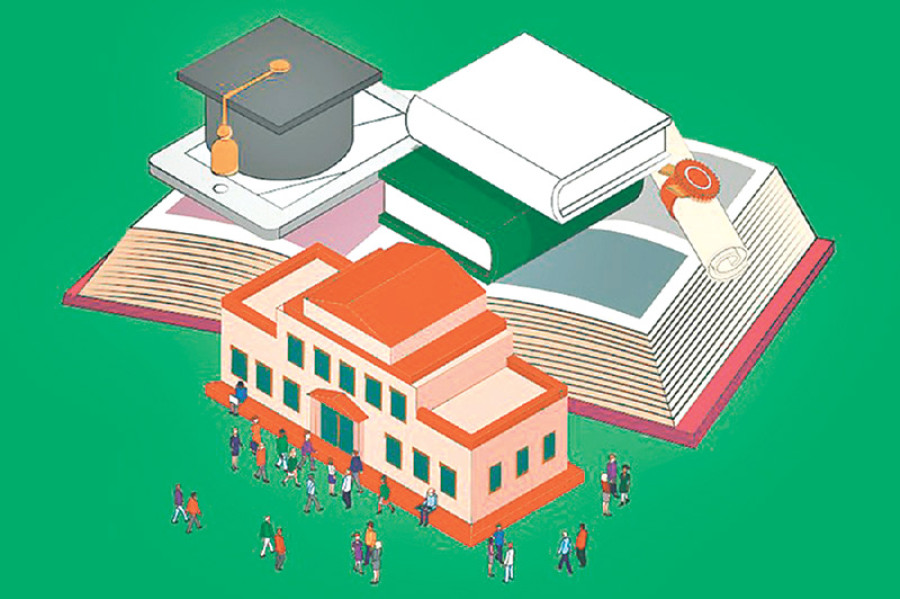Opinion
The Israeli way
Nepal’s education system can learn a few things from Israel, like dropout prevention
Umesh Raj Regmi
I have been closely observing educational and cultural practices in Israel as a participant in an international course entitled ‘Youth at Risk: Preventing Students’ Dropouts and Facilitating Reintegration’ being held in Jerusalem. The course aims to acquaint educators from developing countries with the Israeli education system to let them promote the best possible patterns in their home countries. As school dropout is one of the major unaddressed problems in our education system, there are a lot of questions about quality, equality, equity, budget and transformation of the structure. Likewise, the gap between public and private schools has become a topic of discussion among educators. So there may be a few things we could learn from the global arena.
Learn by example
In Israel, school education is categorised into two levels: elementary (grades 1-7) and high school (grades 8-12). There is a matriculation examination at the end of grade 12. School level education is entirely free and compulsory. There are regular, religious, experimental and professional schools. There are a few private schools and they are non-profit. Government support and control is seen in all schools in a uniform manner. Military service is compulsory after passing the matriculation exam. Mathematics, science, health, art and sports are given priority in school education. With regard to the teaching-learning process, a student-centred approach is practised.
Smartphones, laptops and other gadgets are used as learning tools in the classroom. Hebrew or Arabic is the medium of instruction, and English is taught as an optional subject. All high school students have to perform social work for a day once a week. There are no school uniforms except in a few Orthodox Jewish (religious) schools.
Students with different emotions, interests and disability are taught in different classes in the same school. The teacher-student relationship is very friendly. There is discipline, but physical force is never used. Most importantly, sex education is mandatory in high school, and all students above 12 years of age are given special counselling on safe sexual activity. Students are greatly encouraged to set their career goals before their matriculation. There are theoretical lessons, but with sufficient practical and project work. There are psychologists and social workers in all schools. Students are also taught social skills and about leading an independent life from grade 10.
Curb dropouts
In Nepal, there are an estimated 7 million children studying at the school level. According to a flash report of the Department of Education, the dropout rate is about 20 percent. Israel has a dropout rate of around 8 percent. Students leave school for religious, social or familial reasons. In order to minimise dropout rates, the Israeli Ministry of Education makes a careful projection of the data and plans accordingly. It maintains regular coordination with other ministries and national policymakers.
Proactive screening in schools is one of the best methods of dropout prevention in Israel. Students at risk are seen to come out onto the streets frequently, behave differently and miss classes repeatedly. To handle this situation, government-funded NGOs play a leading role in talking with them, making them feel comfortable and bringing them to regular or professional school. Students who have been sexually abused or have a history of drug abuse are provided timely intervention by trained social workers and therapists. Due to such counselling, they are not ashamed to return to school with their peers.
In Nepal, the government comes up with different programmes to reduce dropout rates, but the implementation part is weak. Why haven’t dropout risk factors been addressed? The answer is, of course, lax monitoring by the state and irresponsible stakeholders. What Nepal can adopt from the Israeli education system and practices is a responsible role and implementable plans at the national level. If there is to be a better education system in any country, the first and foremost role is always that of the government. The state should act in a strict and effective way. Similarly, classroom size and student-centered teaching can be considered for replication.
Quality over quantity
Even a small effort can become a great model in the future. It is not recommended that we imitate Israeli socio-cultural practices, but their impact on quality education should be taken into account. Let’s not promote physical punishment in the name of discipline and teacher authority in the classroom. Nepal’s schools can also expand information communications technology-based teaching as a powerful tool for learning.
Sometimes, quality education for a few is more important than education for all. No more priority to quantity only. As Nepali society is also changing fast, sexual education in school should be made mandatory. Like professional schools in Israel, vocational schools in Nepal can be the best alternative for dropouts and others. Our curriculum can adopt the social skills development modules and flexible course books. It is important to establish fair and friendly relations between teachers and students in Nepali schools. Let’s allow students to choose their subjects, so that they can explore their potential with interest. Finally, the gap between public and private schools must be bridged with an acceptable and adjustable policy. Education is meant for social development, and schools are just a social enterprise.
Regmi is associated with the Nepal Youth Foundation




 22.12°C Kathmandu
22.12°C Kathmandu










